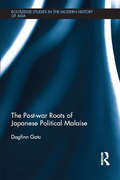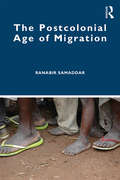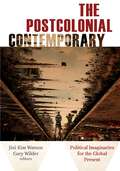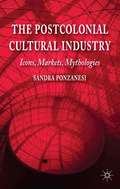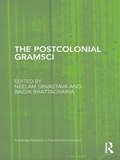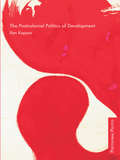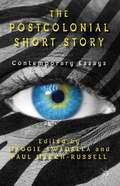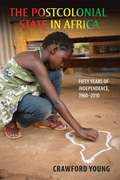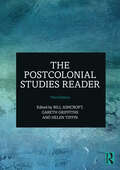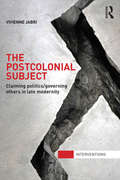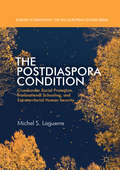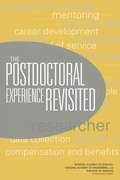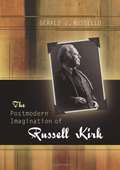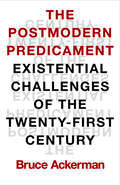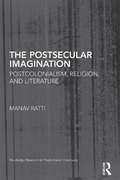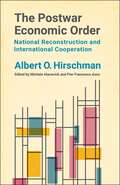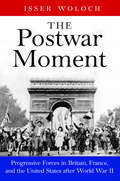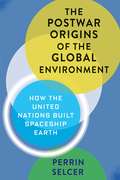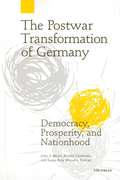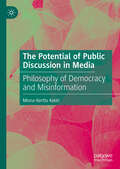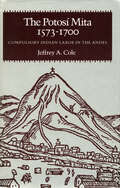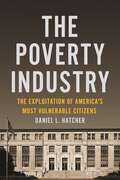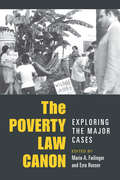- Table View
- List View
The Post-war Roots of Japanese Political Malaise (Routledge Studies in the Modern History of Asia)
by Dagfinn GatuWritings on post-war Japanese politics have tended to take for granted the dominance of the Liberal Democratic Party (LDP) as inevitable, without questioning how this came about. This book analyses the nature of Japanese party politics over the first four decades following the Second World War, assessing how the chief contenders – the conservative LDP and the socialists JSP (Japan Socialist Party) – competed in terms of their strengths and weaknesses relative to the other. Throughout, it addresses the questions: How effectively were the parties’ strengths harnessed? How did they alter over time? To what extent was the winning formula challenged? Did the loser have access to strengths with a major potential, and, if so, why did these remain underdeveloped? It extends widely to include discussion of the political system, the social and economic environment in which parties operated, internal party matters, especially factions, personal support groups, special interest groups, and the role of government bureaucracy. It shows why the Liberal Democratic Party was dominant, why the Japan Socialist Party remained out of power, and how successive prime ministers conducted policymaking in ways which often resulted in the bureaucracy taking the lead. Overall, the book shows how precedents for the political system and for policymaking were set in this important period, precedents which continue, and which have contributed significantly to the present conservative stance on many key issues.
The Postcolonial Age of Migration
by Ranabir SamaddarThis book critically examines the question of migration that appears at the intersection of global neo-liberal transformation, postcolonial politics, and economy. It analyses the specific ways in which colonial relations are produced and reproduced in global migratory flows and their consequences for labour, human rights, and social justice. The postcolonial age of migration not only indicates a geopolitical and geo-economic division of the globe between countries of the North and those of the South marked by massive and mixed population flows from the latter to the former, but also the production of these relations within and among the countries of the North. The book discusses issues such as transborder flows among countries of the South; migratory movements of the internally displaced; growing statelessness leading to forced migration; border violence; refugees of partitions; customary and local practices of care and protection; population policies and migration management (both emigration and immigration); the protracted nature of displacement; labour flows and immigrant labour; and the relationships between globalisation, nationalism, citizenship, and migration in postcolonial regions. It also traces colonial and postcolonial histories of migration and justice to bear on the present understanding of local experiences of migration as well as global social transformations while highlighting the limits of the fundamental tenets of humanitarianism (protection, assistance, security, responsibility), which impact the political and economic rights of vast sections of moving populations. Topical and an important intervention in contemporary global migration and refugee studies, the book offers new sources, interpretations, and analyses in understanding postcolonial migration. It will be useful to scholars and researchers of migration studies, refugee studies, border studies, political studies, political sociology, international relations, human rights and law, human geography, international politics, and political economy. It will also interest policymakers, legal practitioners, nongovernmental organisations, and activists.
The Postcolonial Contemporary: Political Imaginaries for the Global Present
by Jini Kim Watson and Gary Wilder, EditorsThis volume invokes the “postcolonial contemporary” in order to recognize and reflect upon the emphatically postcolonial character of the contemporary conjuncture, as well as to inquire into whether postcolonial criticism can adequately grasp it. Neither simply for nor against postcolonialism, the volume seeks to cut across this false alternative, and to think with postcolonial theory about political contemporaneity.Many of the most influential frameworks of postcolonial theory were developed during the 1970s and 1990s, during what we may now recognize as the twilight of the postwar period. If forms of capitalist imperialism are entering into new configurations of neoliberal privatization, wars-without-end, xenophobic nationalism and unsustainable extraction, what aspects of postcolonial inquiry must be reworked or revised in order to grasp our political present?In twelve essays that draw from a number of disciplines—history, anthropology, literature, geography, indigenous studies— and regional locations (the Black Atlantic, South Africa, South Asia, East Asia, Australia, Argentina) The Postcolonial Contemporary seeks to move beyond the habitual oppositions that have often characterized the field, such as universal vs. particular; Marxism vs. postcolonialism; and politics vs. culture. These essays signal an attempt to reckon with new and persisting postcolonial predicaments and do so under four inter-related analytics: Postcolonial Temporality; Deprovincializing the Global South; Beyond Marxism versus Postcolonial Studies; and Postcolonial Spatiality and New Political Imaginaries.
The Postcolonial Cultural Industry
by Sandra PonzanesiThe Postcolonial Cultural Industry makes a timely intervention into the field of postcolonial studies by unpacking its relation to the cultural industry. It unearths the role of literary prizes, the adaptation industry and the marketing of ethnic bestsellers as new globalization strategies that connect postcolonial artworks to the market place.
The Postcolonial Gramsci (Routledge Research in Postcolonial Literatures)
by Neelam Srivastava Baidik BhattacharyaThe importance of Antonio Gramsci’s work for postcolonial studies can hardly be exaggerated, and in this volume, contributors situate Gramsci's work in the vast and complex oeuvre of postcolonial studies. Specifically, this book endeavors to reassess the impact on postcolonial studies of the central role assigned by Gramsci to culture and literature in the formation of a truly revolutionary idea of the national—a notion that has profoundly shaped the thinking of both Frantz Fanon and Edward Said. Gramsci, as Iain Chambers has argued, has been instrumental in helping scholars rethink their understanding of historical, political, and cultural struggle by substituting the relationship between tradition and modernity with that of subaltern versus hegemonic parts of the world. Combining theoretical reflections and re-interpretations of Gramsci, the scholars in this collection present comparative geo-cultural perspectives on the meaning of the subaltern, passive revolution, hegemony, and the concept of national-popular culture in order to chart out a political map of the postcolonial through the central focus on Gramsci.
The Postcolonial Politics of Development (Postcolonial Politics)
by Ilan KapoorThis book uses a postcolonial lens to question development’s dominant cultural representations and institutional practices, investigating the possibilities for a transformatory postcolonial politics. Ilan Kapoor examines recent development policy initiatives in such areas as ‘governance,’ ‘human rights’ and ‘participation’ to better understand and contest the production of knowledge in development - its cultural assumptions, power implications, and hegemonic politics. The volume shows how development practitioners and westernized elites/intellectuals are often complicit in this neo-colonial knowledge production. Noble gestures such as giving foreign aid or promoting participation and democracy frequently mask their institutional biases and economic and geopolitical interests, while silencing the subaltern (marginalized groups), on whose behalf they purportedly work. In response, the book argues for a radical ethical and political self-reflexivity that is vigilant to our reproduction of neo-colonialisms and amenable to public contestation of development priorities. It also underlines subaltern political strategies that can (and do) lead to greater democratic dialogue.
The Postcolonial Short Story
by Maggie Awadalla Paul March-RussellThis book puts the short story at the heart of contemporary postcolonial studies and questions what postcolonial literary criticism may be. Focusing on short fiction between 1975 and today - the period in which critical theory came to determine postcolonial studies - it argues for a sophisticated critique exemplified by the ambiguity of the form.
The Postcolonial State in Africa
by Crawford YoungIn The Postcolonial State in Africa, Crawford Young offers an informed and authoritative comparative overview of fifty years of African independence, drawing on his decades of research and first-hand experience on the African continent.
The Postcolonial Studies Reader
by Bill Ashcroft, Gareth Griffiths and Helen TiffinThe most comprehensive collection of postcolonial writing theory and criticism, this third edition has been thoroughly revised and updated to include 125 extracts from key works in the field.Leading, as well as lesser-known figures in the fields of writing, theory and criticism contribute to this inspiring body of work that includes sections on nationalism, hybridity, diaspora and globalisation. As in the first two editions, this new edition of The Postcolonial Studies Reader ranges as widely as possible to reflect the remarkable diversity of work in the discipline and the vibrancy of anti-imperialist and decolonising writing both within and without the metropolitan centres.This volume includes new work in the field over the decade and a half since the second edition was published. Covering more debates, topics and critics than any comparable book in its field The Postcolonial Studies Reader provides the ideal starting point for students and issues a potent challenge to the ways in which we think and write about literature and culture.
The Postcolonial Subject: Claiming Politics/Governing Others in Late Modernity (Interventions)
by Vivienne JabriThis book places the lens on postcolonial agency and resistance in a social and geopolitical context that has witnessed great transformations in international politics. What does postcolonial politics mean in a late modern context of interventions that seek to govern postcolonial populations? Drawing on historic and contemporary articulations of agency and resistance and highlighting voices from the postcolonial world, the book explores the transition from colonial modernity to the late modern postcolonial era. It shows that at each moment wherein the claim to politics is made, the postcolonial subject comes face to face with global operations of power that seek to control and govern. As seen in the Middle East and elsewhere, these operations have variously drawn on war, policing, as well as pedagogical practices geared at governing the political aspirations of target societies. The book provides a conceptualisation of postcolonial political subjectivity, discusses moments of its emergence, and exposes the security agendas that seek to govern it. Engaging with political thought, from Hannah Arendt, to Frantz Fanon, Michel Foucault, and Edward Said, among other critical and postcolonial theorists, and drawing on art, literature, and film from the postcolonial world, this work will be of great interest to students and scholars of critical international relations, postcolonial theory, and political theory.
The Postdiaspora Condition
by Michel S. LaguerreThis book aims to fill a void in the literature on the contributions of the state to the social protection, educational training, and human security of its overseas citizens. Additionally, Michel S. Laguerre seeks to explain the rise of the postdiaspora condition: an emancipatory metamorphosis of diaspora status. Laguerre pays particular attention to the crossborder services that the state provides, transfrontier mechanisms developed by various institutions, as well as extraterritorial forms of management and governance. He sheds light on complex crossborder arrangements and management, the multiplicity of crossborder agencies and organizations, and the promulgation of new laws that provide a legal basis for these extraterritorial undertakings by the state. The ability of emigrants to hold citizen status--and to enjoy access to the same rights and privileges as those offered to residents of the homeland--sets the cosmonational context for the performance of the postdiaspora condition.
The Postdoctoral Experience Revisited
by Committee to Review the State of Postdoctoral Experience in Scientists EngineersThe Postdoctoral Experience Revisited builds on the 2000 report Enhancing the Postdoctoral Experience for Scientists and Engineers. That ground-breaking report assessed the postdoctoral experience and provided principles, action points, and recommendations to enhance that experience. Since the publication of the 2000 report, the postdoctoral landscape has changed considerably. The percentage of PhDs who pursue postdoctoral training is growing steadily and spreading from the biomedical and physical sciences to engineering and the social sciences. The average length of time spent in postdoctoral positions seems to be increasing. The Postdoctoral Experience Revisited reexamines postdoctoral programs in the United States, focusing on how postdocs are being guided and managed, how institutional practices have changed, and what happens to postdocs after they complete their programs. This book explores important changes that have occurred in postdoctoral practices and the research ecosystem and assesses how well current practices meet the needs of these fledgling scientists and engineers and of the research enterprise. The Postdoctoral Experience Revisited takes a fresh look at current postdoctoral fellows - how many there are, where they are working, in what fields, and for how many years. This book makes recommendations to improve aspects of programs - postdoctoral period of service, title and role, career development, compensation and benefits, and mentoring. Current data on demographics, career aspirations, and career outcomes for postdocs are limited. This report makes the case for better data collection by research institution and data sharing. A larger goal of this study is not only to propose ways to make the postdoctoral system better for the postdoctoral researchers themselves but also to better understand the role that postdoctoral training plays in the research enterprise. It is also to ask whether there are alternative ways to satisfy some of the research and career development needs of postdoctoral researchers that are now being met with several years of advanced training. Postdoctoral researchers are the future of the research enterprise. The discussion and recommendations of The Postdoctoral Experience Revisited will stimulate action toward clarifying the role of postdoctoral researchers and improving their status and experience.
The Postmodern Imagination of Russell Kirk
by Gerald J. RusselloExamines such concepts of Russell Kirk's thought as imagination, historical consciousness, the interplay between the individual and tradition, and the role of narrative in constructing individual and societal identity. Focuses on Kirk's role in the development of the new conservatism of the 1950s and 1960s and his critique of modernity.
The Postmodern Predicament: Existential Challenges of the Twenty-First Century
by Bruce AckermanOne of our most influential political theorists offers a boundary-breaking—and liberating—perspective on the meaning of life in the internet age Human beings have taken one thing for granted since our earliest days: we are bodily creatures dealing with one another on a face-to-face basis. The internet has shattered this fundamental feature of human existence. We are suddenly living our lives in two worlds at once—shifting endlessly from virtual to physical reality as we reach out to others. Worse yet, we are developing different personal identities in our two worlds. We say and do things in virtual reality that flatly contradict our face-to-face commitments to family, friends, and fellow-workers—and vice versa. The Postmodern Predicament explores these dilemmas at each phase of the life cycle, beginning at the moment a young child picks up a cell phone. The existentialist tradition of the twentieth century provides a precious perspective on our postmodern dilemmas. Thinkers and doers like Simone de Beauvoir and Jean-Paul Sartre considered the fragmentation of modern life as a central source of contemporary anxieties. Like them, Ackerman views the challenges of the internet age as a political, no less than personal, problem—and proposes concrete reforms that that could mobilize broad-based support for democracy against demagogic assaults on its very foundations.
The Postsecular Imagination: Postcolonialism, Religion, and Literature (Routledge Research in Postcolonial Literatures)
by Manav RattiThe Postsecular Imagination presents a rich, interdisciplinary study of postsecularism as an affirmational political possibility emerging through the potentials and limits of both secular and religious thought. While secularism and religion can foster inspiration and creativity, they also can be linked with violence, civil war, partition, majoritarianism, and communalism, especially within the framework of the nation-state. Through close readings of novels that engage with animism, Buddhism, Christianity, Hinduism, Islam, and Sikhism, Manav Ratti examines how questions of ethics and the need for faith, awe, wonder, and enchantment can find expression and significance in the wake of such crises. While focusing on Michael Ondaatje and Salman Rushdie, Ratti addresses the work of several other writers as well, including Shauna Singh Baldwin, Mahasweta Devi, Amitav Ghosh, and Allan Sealy. Ratti shows the extent of courage and risk involved in the radical imagination of these postsecular works, examining how writers experiment with and gesture toward the compelling paradoxes of a non-secular secularism and a non-religious religion. Drawing on South Asian Anglophone literatures and postcolonial theory, and situating itself within the most provocative contemporary debates in secularism and religion, The Postsecular Imagination will be important for readers interested in the relations among culture, literature, theory, and politics.
The Postwar Economic Order: National Reconstruction and International Cooperation
by Albert O. HirschmanYears before he became renowned as one of the most original social scientists of the twentieth century, Albert O. Hirschman played an active role in the rebuilding of postwar Europe. Between 1946 and 1952, he worked as an economic analyst in the Research Division of the Federal Reserve Board of the United States, focusing on the reconstruction of Europe and the Marshall Plan. In that capacity, Hirschman wrote a number of reports about European economic policies, the first efforts at intra-European cooperation, and the uncertainties that surrounded the shaping of a new international economic order with the United States at its core.The Postwar Economic Order presents a collection of these interrelated reports, which offer incisive firsthand analysis of postwar Europe and give a behind-the-scenes view of American debates on European economic recovery. They feature nuanced and sophisticated discussion of topics such as the postwar “dollar shortage,” U.S.-European relations, and the first steps toward European economic integration. Hirschman provides original and perceptive interpretations of the struggles that European governments faced along their paths toward economic recovery. Throughout, Hirschman’s stylistic gifts and characteristic ways of reasoning are on full display as he highlights the counterintuitive and paradoxical aspects of economic and political processes. Shedding new light on the origins of European economic cooperation, this book provides unparalleled insight into the development of Hirschman’s thinking on economic development and reform.
The Postwar Moment: Progressive Forces in Britain, France, and the United States after World War II
by Isser WolochAn incisive, comparative study of the development of Post–World War II progressive politics in the United States, Britain, and France After the end of World War II, Britain, France, and the United States were faced with two very different choices: return to the civic order of pre-war normalcy or embark instead on a path of progressive transformation. In this ambitious and original work, Isser Woloch assesses the progressive agendas that crystalized in each of the three allied democracies, tracing their roots in the interwar decades, their development during wartime, the struggles to establish them after the war’s end, and the mixed outcome in each country. A fellow of the Guggenheim Foundation, the National Endowment for the Humanities, and the Institute for Advanced Study at Princeton, Woloch is a highly regarded scholar who adds the United States to a discussion that is usually focused solely on Europe. His enlightening work successfully argues that the postwar moment deserves a more prominent place in the history of progressive politics.
The Postwar Origins of the Global Environment: How the United Nations Built Spaceship Earth (Columbia Studies in International and Global History)
by Perrin SelcerIn the wake of the Second World War, internationalists identified science as both the cause of and the solution to world crisis. Unless civilization learned to control the unprecedented powers science had unleashed, global catastrophe was imminent. But the internationalists found hope in the idea of world government. In The Postwar Origins of the Global Environment, Perrin Selcer argues that the metaphor of “Spaceship Earth”—the idea of the planet as a single interconnected system—exemplifies this moment, when a mix of anxiety and hope inspired visions of world community and the proliferation of international institutions.Selcer tells the story of how the United Nations built the international knowledge infrastructure that made the global-scale environment visible. Experts affiliated with UN agencies helped make the “global”—as in global population, global climate, and global economy—an object in need of governance. Selcer traces how UN programs such as UNESCO’s Arid Lands Project, the production of a soil map of the world, and plans for a global environmental-monitoring system fell short of utopian ambitions to cultivate world citizens but did produce an international community of experts with influential connections to national governments. He shows how events and personalities, cultures and ecologies, bureaucracies and ideologies, decolonization and the Cold War interacted to make global knowledge. A major contribution to global history, environmental history, and the history of development, this book relocates the origins of planetary environmentalism in the postwar politics of scale.
The Postwar Transformation of Germany: Democracy, Prosperity, and Nationhood
by Brady John S. Crawford Beverly Wiliarty Sarah EliseAs Germany celebrates the fiftieth anniversary of the founding of the Federal Republic of Germany--the former West Germany-- leading scholars take stock in this volume of the political, social, and economic progress Germany made as it built a democratic political system and a powerful economy, survived the Cold War, and dealt with the challenges of reunification. The contributors address issues such as Germany's response to extremists, the development of a professional civil service, judicial review, the maintenance of the welfare state, the nature of contemporary German nationalism, and Germany's role in the world. Contributors are Thomas Banchoff, Thomas U. Berger, Patricia Davis, Ernst Haas, Jost Halfmann, Christard Hoffmann, Carl-Lugwig Holtfrerich, Donald P. Kommers, Wolfgang Krieger, Peter Krueger, Gregg O. Kvistad, Ludger Lindlar, Charles Maier, Andrei Markovitz, Peter Merkl, Claus Offe, Simon Reich, and Michaela Richter. John S. Brady and Sarah Elise Wiliarty are doctoral candidates in the Department of Political Science, University of California, Berkeley. Beverly Crawford is Professor of Political Science, Senior Lecturer in Political Economy of Industrial Societies, and Associate Director, Center for German and European Studies, University of California, Berkeley.
The Potential Consequences of Public Release of Food Safety and Inspection Service Establishment-Specific Data
by Committee on a Study of Food Safety Other Consequences of Publishing Establishment-Specific DataThe Food Safety and Inspection Service (FSIS) is the regulatory agency in the US Department of Agriculture that is responsible for ensuring that meat, poultry, and processed egg products produced domestically or imported into the United States are safe, wholesome, and properly labeled. FSIS collects a voluminous amount of data in support of its regulatory functions, but the two major types of FSIS data that are currently being considered for public release are sampling and testing data (derived from standard laboratory tests) and inspection and enforcement data (derived from text written by inspectors). Some of those data are already released to the public in aggregated form but not in disaggregated, establishment-specific form. In recent years, the Obama administration has implemented measures to facilitate openness in government, including the requirement that federal agencies publish information online and provide public access to information in a timely manner; in a form that can be easily retrieved, downloaded, indexed, and searched with tools that are available on the Internet; and without the need for Freedom of Information Act (FOIA) requests. The Potential Consequences of Public Release of Food Safety and Inspection Service Establishment-Specific Data examines the potential food-safety benefits and other consequences of making establishment-specific data publicly available on the Internet. The report includes how factors such as level of aggregation, timing of release, level of completeness, and characterization of the data or context in which the data are presented might affect their utility in improving food safety. The report also examines potential ways that food-safety benefits and other effects of publicly posting the data might be measured.
The Potential Contribution of Fiscal Policy to Rebalancing and Growth in New Zealand
by Werner SchuleA report from the International Monetary Fund.
The Potential of Public Discussion in Media: Philosophy of Democracy and Misinformation
by Minna-Kerttu KekkiA friend recommended an interesting news article to you that changed your view on the topic. Later, you find out that the information in the article was false. Did you learn something, even though the information was not correct? From the subjective perspective at that moment, the answer is “yes,” but from the objective perspective, you were led false. “The Potential of Public Discussion in Media: Philosophy of Democracy and Misinformation,” takes up two perspectives on public discussions in media: the outsider’s third-person perspective and the first-person perspective of the engaged subject. By investigating public discussion in media through both perspectives, public discussion appears simultaneously both crucial and risky for democracy. The book uses phenomenology to frame the problematic of contemporary public discussions in media, which emphasizes the subjective experience of gaining new information.
The Potosí Mita, 1573-1700: Compulsory Indian Labor in the Andes
by Jeffrey A. ColePotosí, a mining center in what is now Bolivia, was the most productive source of silver in the Spanish American Empire between the mid-1500's and the late seventeenth century. Much of this success was attributable, at least initially, to the mita, a system of draft Indian labor instituted by Viceroy Francisco do Toledo in 1573 for the working of the silver mines and refineries. Bitter debate swirled around the mita during most of its 250-year history. It was assailed by its enemies as a form of servitude worse than slavery and accused of depopulating the provinces subject to it, yet it was supported by many, however reluctantly, who believed that the Spanish Empire depended on Potosí silver for its survival. The author traces the evolution of the mita from its inception to the end of the Hapsburg epoch in 1700. The primary focus is on the metamorphosis of the mita under the pressures of changing production realities at Potosí and demographic developments in the provinces from which the Indians were drafted. The author describes the role of native headmen (kurakas) in the system, the means used by Indians to evade service, and the efforts of the mining guild to tailor the mita to its needs. The secondary focus is on the Hapsburg government's administration of the mita, especially those factors that prevented the Crown or its viceroys from being fully effective.
The Poverty Industry: The Exploitation of America's Most Vulnerable Citizens (Families, Law, and Society #11)
by Daniel L HatcherHow funds for the needy are siphoned off for profit: &“A distressing picture of how states routinely defraud taxpayers of millions of federal dollars.&” ―Boston Review Government aid doesn&’t always go where it&’s supposed to. Foster care agencies team up with companies to take disability and survivor benefits from abused and neglected children. States and their revenue consultants use illusory schemes to siphon Medicaid funds intended for children and the poor into general state coffers. Child support payments for foster children and families on public assistance are converted into government revenue. And the poverty industry keeps expanding, leaving us with nursing homes and juvenile detention centers that sedate residents to reduce costs and maximize profit, local governments buying nursing homes to take the facilities&’ federal aid while the elderly languish with poor care, and counties hiring companies to mine the poor for additional funds in modern day debtor&’s prisons. In The Poverty Industry, Daniel L. Hatcher shows us how state governments and their private-industry partners are profiting from the social safety net, turning America&’s most vulnerable populations into sources of revenue and stealing billions. As policy experts across the political spectrum debate how to best structure government assistance programs, a massive siphoning of the safety net is occurring behind the scenes. In the face of these abuses of power, Hatcher offers a road map for reforms to realign the practices of human service agencies with their intended purpose, to prevent the misuse of taxpayer dollars—and ensure that aid truly reaches those in need. &“Meticulously researched . . . lifts the lid on a system that rather than helping the needy, systematically turns them into &‘a source of revenue.&’&” ―The Guardian &“Walks through the evolution of legal doctrine regarding rights of vulnerable persons [and] provides compelling evidence that scholars, policymakers, and advocates should take a closer look at the political and business relationships shaping contracting decisions involving for-profit firms.&” ―Political Science Quarterly
The Poverty Law Canon: Exploring the Major Cases
by Ezra Rosser Marie FailingerThe Poverty Law Canon takes readers into the lives of the clients and lawyers who brought critical poverty law cases in the United States. These cases involved attempts to establish the right to basic necessities, as well as efforts to ensure dignified treatment of welfare recipients and to halt administrative attacks on federal program benefit levels. They also confronted government efforts to constrict access to justice, due process, and rights to counsel in child support and consumer cases, social welfare programs, and public housing. By exploring the personal narratives that gave rise to these lawsuits as well as the behind-the-scenes dynamics of the Supreme Court, the text locates these cases within the social dynamics that shaped the course of litigation. Noted legal scholars explain the legal precedent created by each case and set the case within its historical and political context in a way that will assist students and advocates in poverty-related disciplines in their understanding of the implications of these cases for contemporary public policy decisions in poverty programs. Whether the focus is on the clients, on the lawyers, or on the justices, the stories in The Poverty Law Canon illuminate the central legal themes in federal poverty law of the late 20th century and the role that racial and economic stereotyping plays in shaping American law.
